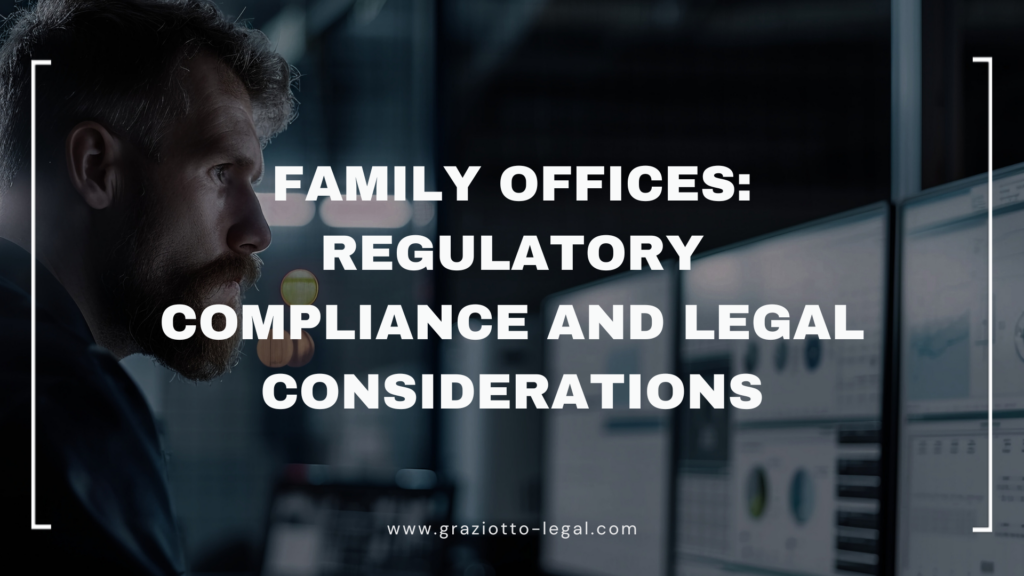

Since 2010, the Global Law Experts annual awards have been celebrating excellence, innovation and performance across the legal communities from around the world.
Navigating regulatory compliance and legal considerations is paramount to the successful management of a family office. The family office space has become subject to increased scrutiny from regulators and is expected to comply with a myriad of regulations that vary across jurisdictions.
The regulatory environment governing family offices is vast and complex. Laws and regulations differ substantially across jurisdictions and can encompass aspects such as securities regulations, anti-money laundering (AML) rules, tax laws, privacy laws, and fiduciary obligations.
Many family offices manage investments, and this can subject them to securities regulations. Compliance with securities laws such as the U.S. Investment Advisers Act, or similar regulations in other jurisdictions, requires adherence to specific disclosure, reporting, and conduct rules.
Implementing robust AML and CTF compliance programs is mandatory. This includes implementing policies and procedures to detect, prevent, and report potentially suspicious activities in line with the Financial Action Task Force (FATF) recommendations.
Family offices handle sensitive personal information. Compliance with data privacy laws like GDPR in Europe or the California Consumer Privacy Act (CCPA) in the U.S. is critical. It involves implementing stringent measures to protect personal data and respecting the data rights of individuals.
Tax laws can be intricate and vary widely across countries. Proper understanding and compliance with international tax laws and treaties are essential to avoid penalties and ensure that the family’s wealth is managed tax-efficiently.
Family offices often act in a fiduciary capacity for their clients. This role imposes legal obligations to act in the client’s best interest, requiring transparency, disclosure of conflicts of interest, and the prudent management of assets.
Family offices employ various professionals. Compliance with employment laws, including those related to compensation, benefits, discrimination, and workplace safety, is vital.
Ethical considerations go hand in hand with legal compliance. Adopting a robust code of ethics that guides decision-making can reinforce a culture of integrity and accountability.
Building a positive relationship with regulators through transparency, cooperation, and regular communication can facilitate compliance efforts and reduce the risk of regulatory actions.
Having an in-house or external legal and compliance team with expertise in the relevant jurisdictions can provide valuable support in navigating the complex regulatory landscape.
Implementing regular internal audits and compliance reviews ensures that the family office remains compliant with all applicable laws and regulations.
Having a clear crisis management plan in place can mitigate legal risks. This includes a process for addressing regulatory inquiries or investigations, media scrutiny, and other crisis situations.
Regular training for employees on regulatory compliance and legal obligations ensures that they are aware of and understand the laws and regulations that govern their functions.
Utilizing technology solutions for compliance management can streamline processes, improve accuracy, and provide real-time monitoring of compliance risks.
For family offices operating across borders, understanding and complying with the legal requirements of each jurisdiction is essential. This includes considerations related to cross-border data transfers, investments, and reporting obligations.
Regulatory environments can change with political shifts. Monitoring these changes and understanding their implications is crucial for compliance.
In conclusion, regulatory compliance and legal considerations are complex but vital components of family office management. Family offices must be proactive, informed, and agile in their approach to compliance.
Investing in the right resources, tools, and professional expertise can foster a culture of compliance, safeguard the family office from legal risks, and contribute to its long-term success.
For more in-depth information you can consult my latest book «The Global Manual for Family Offices», Volume 1, Chapter 4.3.2, Pg. 272.
http://amazon.com/author/fulvio-graziotto
For more up to date legal insights follow us @GLE News
Author


No results available
posted 11 hours ago
posted 15 hours ago
posted 15 hours ago
posted 15 hours ago
posted 15 hours ago
posted 15 hours ago
No results available
Find the right Legal Expert for your business
Global Law Experts is dedicated to providing exceptional legal services to clients around the world. With a vast network of highly skilled and experienced lawyers, we are committed to delivering innovative and tailored solutions to meet the diverse needs of our clients in various jurisdictions.

Thinking of buying property in Brazil? Start with a full legal safety net.
✔️ Check title and ownership history
✔️ Verify no debts or disputes
✔️ Confirm zoning and permits.
#BrazilProperty #RealEstateInvesting #LegalDueDiligence #ForeignInvestment #PropertyLaw #GlobalRealEstate #InvestmentRisk #BrazilLaw

When your international business faces financial distress, quick action is key! 🔑 Negotiating with creditors, restructuring debt, and understanding insolvency laws can help regain stability. Global Law Experts is here to guide you through your options.
🌍Explore the details on our website.
🔗Link in bio
#GlobalLawExperts #CommercialLaw #BusinessLaw #LegalAdvice #BusinessGrowth #LegalTips #BusinessStrategy #LegalCompliance #Law #LegalKnowledge #LegalAwareness #Law101 #LegalEducation #IntellectualProperty

Thinking of buying property in Brazil? Don’t stop at the contract or key handover. Make sure the title is officially registered before calling it yours.
#BrazilRealEstate #PropertyLaw #GlobalInvestment #ForeignInvestors #LegalTips #DueDiligence #RealEstateRegistration #SecureInvestment

Getting a termination notice right now? Know your rights. Valid reason, fair process, proper notice they matter. Don’t let a bad dismissal walk away without accountability.
#EmploymentLaw #WorkerRights #Termination #LaborLaw #FairDismissal #WorkplaceJustice #LegalAwareness #GlobalWorkforce

Running a business is hard enough — lawsuits shouldn’t make it harder. 🚫 Protect your business with the right legal strategies and expert tools from Global Law Experts. Let’s secure your future together! 💼
🌍Explore the details on our website.
➡️www.globallawexperts.com
#GlobalLawExperts #CommercialLaw #BusinessLaw #LegalAdvice #BusinessGrowth #LegalTips #BusinessStrategy #LegalCompliance #Law #LegalKnowledge #LegalAwareness #Law101 #LegalEducation #IntellectualProperty #Infringed #Ecommerce #LegalBranding
Global Law Experts is dedicated to providing exceptional legal services to clients around the world. With a vast network of highly skilled and experienced lawyers, we are committed to delivering innovative and tailored solutions to meet the diverse needs of our clients in various jurisdictions.

Thinking of buying property in Brazil? Start with a full legal safety net.
✔️ Check title and ownership history
✔️ Verify no debts or disputes
✔️ Confirm zoning and permits.
#BrazilProperty #RealEstateInvesting #LegalDueDiligence #ForeignInvestment #PropertyLaw #GlobalRealEstate #InvestmentRisk #BrazilLaw

When your international business faces financial distress, quick action is key! 🔑 Negotiating with creditors, restructuring debt, and understanding insolvency laws can help regain stability. Global Law Experts is here to guide you through your options.
🌍Explore the details on our website.
🔗Link in bio
#GlobalLawExperts #CommercialLaw #BusinessLaw #LegalAdvice #BusinessGrowth #LegalTips #BusinessStrategy #LegalCompliance #Law #LegalKnowledge #LegalAwareness #Law101 #LegalEducation #IntellectualProperty

Thinking of buying property in Brazil? Don’t stop at the contract or key handover. Make sure the title is officially registered before calling it yours.
#BrazilRealEstate #PropertyLaw #GlobalInvestment #ForeignInvestors #LegalTips #DueDiligence #RealEstateRegistration #SecureInvestment

Getting a termination notice right now? Know your rights. Valid reason, fair process, proper notice they matter. Don’t let a bad dismissal walk away without accountability.
#EmploymentLaw #WorkerRights #Termination #LaborLaw #FairDismissal #WorkplaceJustice #LegalAwareness #GlobalWorkforce

Running a business is hard enough — lawsuits shouldn’t make it harder. 🚫 Protect your business with the right legal strategies and expert tools from Global Law Experts. Let’s secure your future together! 💼
🌍Explore the details on our website.
➡️www.globallawexperts.com
#GlobalLawExperts #CommercialLaw #BusinessLaw #LegalAdvice #BusinessGrowth #LegalTips #BusinessStrategy #LegalCompliance #Law #LegalKnowledge #LegalAwareness #Law101 #LegalEducation #IntellectualProperty #Infringed #Ecommerce #LegalBranding
Send welcome message